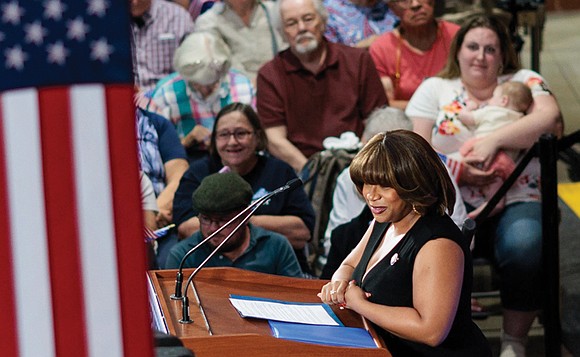State Democrats celebrate new maternal health care laws
Shaban Athuman/VPM News | 7/3/2025, 6 p.m.

“Moms, babies and families across the commonwealth will begin to feel the benefit of maternal health policies that fundamentally transform how Virginia supports mothers, babies, and families,” said LeVere Bolling. The crowd fanned their faces with handouts on the package legislation, which Democrats called “the momnibus.”
LeVere Bolling called the bills’ authors to the stage, giving each delegate a folder with a copy of their bill in a graduation-like flourish.
“It’s a hot day, but a great day,” said House Speaker Don Scott (D–Portsmouth). “Too many mothers, too many babies have been suffering and dying because of a broken health care system.”
The bills are Democrats’ answer to disparities in maternal mortality, a long waitlist for subsidized child care, and access to health care.
Recent legislative efforts on the issue of infant and maternal mortality trace back to 2019, said Brandy Faulkner, a political science professor at Virginia Tech. At the time, former Gov. Ralph Northam, a Democrat, went on a statewide “listening tour” in the wake of allegations he appeared in blackface in a photo in a medical school yearbook.
Northam, a pediatric neurologist by trade, “learned a lot about health care disparities across our state, and began not only to push for policies that would change that landscape, but actually fund them,” she said. “We’re seeing right now the culmination of almost a decade of work.”
Racial disparities in maternal health outcomes are still stark: Black women die at a rate more than twice that of white women within 42 days of giving birth, according to a 2024 report from the Virginia Department of Health.
Other issues affecting women are also in high relief: Over 10,000 children are on a waitlist for subsidized child care in Virginia, with many families opting out of the workforce to take care of their children. And the commonwealth has also seen a sharp increase in abortions since the US Supreme Court’s 2022 decision to overturn Roe v. Wade; Over 1,600 Floridians came to Virginia last year to receive health care in the only state in the South that still has legal abortion, according to the Guttmacher Institute.
One of the new laws allows pregnant people to get insurance on the Virginia Health Benefit Exchange as part of a special enrollment period. Another begins the process of developing a mobile app with resources for pregnant Medicaid recipients.
Changes to the health care workforce are also now law: State doula coverage now extends into the postpartum period, private insurers must pay licensed midwives as certified nurse midwives, and more midwives will be allowed to establish private practices.
Legislators at the event said if Democrats keep the majority, more maternal health bills would be passed. They mentioned a bill that required implicit bias training in particular, which Youngkin vetoed.
“We will be back in just a few months with our 2.0 version,” said Scott.
Scott is set to bring the issues to voters as he seeks to expand the House of Delegates’ slim Democratic majority.
“Maternal health disparities, which the governor has acknowledged exist, are part of that landscape,” said Faulkner. “It’s really interesting to see, on the one hand, him condemn DEI as a set of principles and practices, but also recognize the disparities and the racism that still exists.”
Winning women’s votes has been at the forefront of electoral politics since the U.S. Supreme Court removed federal abortion protections. In Virginia, women made up 53% of registered voters, according to a November publication from the Virginia Public Access Project.
Nationwide, parents of minor children tended to skew Republican regardless of gender, according to The Pew Research Center.
Faulkner said that those statistics are more complicated in practice.
“Ideology really becomes salient in these discussions. It’s not so much whether the women have children or don’t have children, it’s how strongly they feel about the issue,” said Faulkner, citing contraception and abortion, for example.
Consequently, Virginia’s Democrats and Republicans have been engaging in a back-and-forth over who can take more credit for the new policies and their funding.
Another new law requires training for medical professionals in recognizing pregnancy-related emergencies. When Republican Gov. Glenn Youngkin ceremonially signed the bill, its chief House sponsor, Del. Cliff Hayes (D–Chesapeake), was not there.
“We’re not looking for one opportunity to take a snapshot, a picture, a video and talk about a [single] bill,” said Hayes. “We’re talking about this comprehensive drive to save lives.”
Instead, Del. Kim Taylor (R–Petersburg)— whose legislation was incorporated into Hayes’ bill — was present at the signing, and in a press release, the governor’s office said Taylor had “originally introduced” the bill.
Taylor represents one of the most competitive districts in this fall’s election, and has written about her approach to offering fertility treatments.
In an emailed statement, Taylor said she would push for more maternal care and fertility treatments if re-elected: “I’m committed to expanding affordable childcare and enhancing mental health support for all mothers. While my Democratic colleagues push for radical, no-limit abortion policies that disregard parental consent, I stand firmly with the majority of Virginians who want common-sense safeguards.”
When asked how these new laws would affect Democrats’ chances in November, Scott instead pointed to before he became speaker and said voters brought the issue to him. Later, a Portsmouth Health Department employee recalled speaking to Scott about the issue years ago.
“It’s not about just elections. It’s about the policy that you implement,” said Scott. “This is a by-product of the people’s trust in us that we got to pass.”






